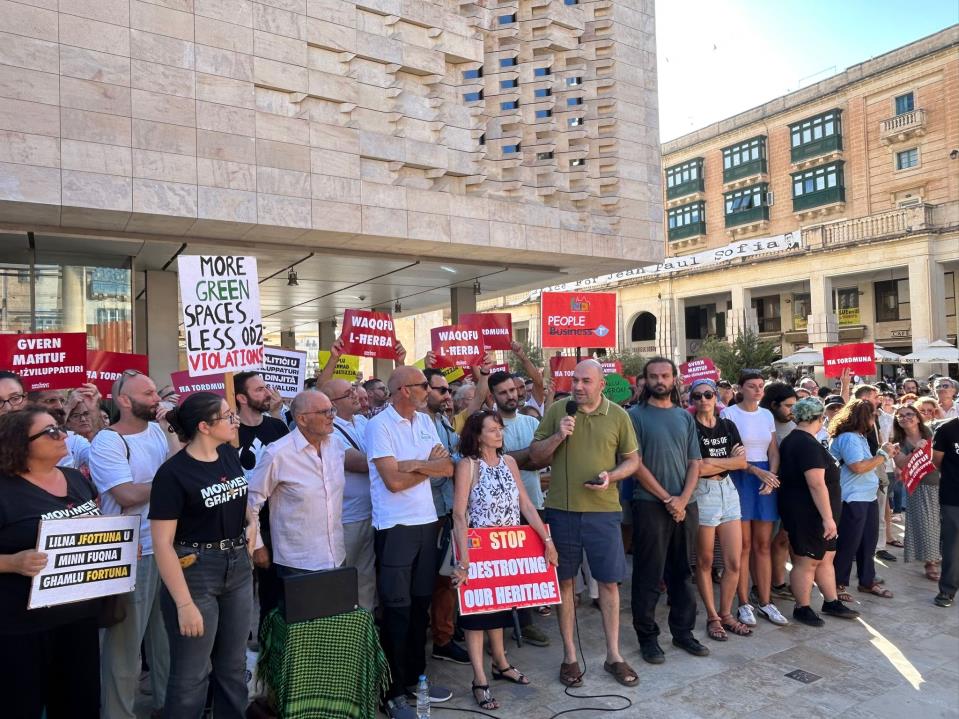Leading environmental NGOs have called on government to immediately withdraw two controversial planning reform bills, warning that they would dismantle Malta’s planning system, reward illegality, and threaten citizens’ legal rights.
Speaking outside Parliament during a press conference organised by Moviment Graffitti on Monday evening, representatives from The Ramblers’ Association, the Gozo Coalition of NGOs for the environment, Flimkien għal Ambjent Aħjar (FAA), and Moviment Graffitti said that the proposed reforms were not only unacceptable, but also dangerously undemocratic.
Other NGOs present were Azzjoni: Tuna Artna Lura; BirdLife Malta; Din l-Art Ħelwa; Flimkien għal Ambjent Aħjar; Friends of the Earth Malta; Għawdix; Moviment Graffitti; Nature Trust – FEE Malta; Ramblers Association and Wirt Għawdex.
The two proposed bills: Bill 143 which aims to amend the Development Planning Act and Bill 144 that is looking to reform the appeals process, were tabled in Parliament last week.
Amongst the many changes, the proposed laws aim to suspend development permits once a formal appeal has been lodged. But there are other reforms which have garnered plenty of criticism.
Various aspects of the bills have also been heavily criticised, with groups arguing that the Courts would no longer be allowed to outright revoke a permit during an appeal, and that it would weaken existing safeguards in the planning process.
NGOs had said that should the government persist in enforcing these laws, “it would spell disaster for Malta and for the future of its children.”
Graffitti’s Andre Callus – who had just confronted the Prime Minister some minutes earlier – said that these bills are not reforms, but rather they represent a total dismantling of Malta’s planning rules.
“Our only demand is for these bills to be withdrawn immediately. Only then can we discuss,” Callus said.
Ingram Bondin, of The Ramblers’ Association, said he never imagined that, years after the controversial rationalisation scheme, “we would be facing something a hundred times worse.”
He described the bills as “designed to destroy the planning system and legal certainty,” with their true aim being to centralise discretion and weaken safeguards.
“We currently have a system with rules and laws that apply to everyone, albeit flawed. The Prime Minister now wants to introduce preferential treatment, if you’re in favour, you’ll get a permit, and if not, the rules will apply to you,” he said.
Bondin also warned that the reforms would open the door to systematic abuse.
“Today we have plans and safeguards. With these bills, all of that disappears. These bills are for contractors, written by them and for them,” Bondin said.
One of the most alarming provisions, NGOs said, is that the bills will essentially provide an amnesty for illegal developments, allowing those who built unlawfully to regularise their properties through a fine and gain a permit, regardless of planning policies.
“This will unleash a wave of illegalities. People will build whatever they want, wait 10 years, and then get another amnesty under the next government. This is the contractors’ reform,” Bondin said.
Callus said that the proposed bills would also curtail the public’s right to object and appeal development decisions.
Callus explained that appeals would become nearly impossible due to new limitations, such as forcing appeals to be based on technical and legal arguments before an application is even processed, and requiring that objections are made within less than a one-month window.
Callus said that the reforms would also weaken the courts’ powers to revoke permits granted unlawfully by the Planning Authority (PA).
“They are stripping away the judiciary’s powers and shifting decisions to a government-appointed tribunal. The sharks have built themselves a loophole,” Callus said.
He accused the government of acting in bad faith by claiming the reform was only about the appeals system.
“For two years, we were told this was a reform of planning appeals. We asked to be consulted. They never met us. Then on Friday evening, the draft laws were dumped on us without warning, and they cover the entire planning system,” Callus said.
FAA’s Astrid Vella pointed to the hypocrisy of government promises.
“We protested the rationalisation scheme years ago. Then-Prime Minister Joseph Muscat had sworn it would be reversed. Not only did that never happen, but now we are faced with something a hundred times worse,” Vella said.
She described the proposed penalties for “frivolous” objections, up to €5,000, as an intimidation tactic.
“Today, an objector in Gozo even received a threat of a €2,500 fine for simply objecting. Our rights are being stripped. The developers are our new colonisers,” Vella said.
Josmar Azzopardi, speaking on behalf of the Gozo NGOs, said that NGOs on the island had been actively working to propose improvements to planning.
“We asked for meetings, we put forward proposals. Then suddenly, these bills were shoved in our faces, with no consultation and no warning,” Azzopardi said.
He said Gozo NGOs had filed court cases against irregular developments and policies, only to now see those same protections overridden.
“Energy that should go into protecting historic sites and rural areas is now being wasted just to defend basic planning rights,” he said.
Callus closed the press conference with a warning, saying that these two draft laws should never have seen the light of day.
“In the name of democracy, we demand they are withdrawn, not as a favour, but as a matter of principle, and only then can we discuss,” Callus said.
He said the government was “insulting NGOs” by suggesting that public consultation could happen now.
“You do not consult on a law like this once it is already on the table. You consult when you start drafting it, not after,” Callus said.
“This is an existential fight. If these bills pass, Malta will become a building desert. Withdraw them now, because you will find fierce resistance ahead,” Callus said, addressing government.
